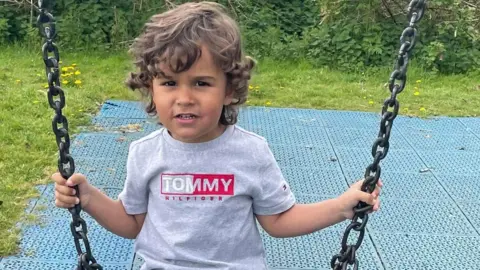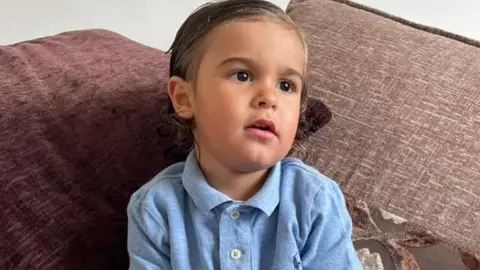Missed chances to prevent boy's sepsis death
 Family Photo
Family PhotoMissed opportunities to provide earlier care contributed to the death of a three-year-old boy, an inquest jury has concluded.
Theo Tuikubulau died from a Strep A infection which led to sepsis, the jury at County Hall in Exeter concluded.
Kayleigh Kenneford called 111 on the evening of 7 July, 2022, because her son was unwell, but the inquest heard ambulance crews took 90 minutes to reach Theo's home in Torpoint, Cornwall, due to the grading given to the call. He died in the early hours the next day.
The jury heard Theo would not have had a cardiac arrest and would not have died if he had arrived at hospital sooner.
Ms Kenneford told the inquest Theo was a "happy, loving and affectionate little boy" who was obsessed with buses and fire engines and loved being at nursery.
 Family Photo
Family PhotoThe 10-person jury concluded delays in ambulances, ambulance call categorisations and a 72-hour hotline to the hospital's child assessment unit all contributed to his death.
The jury concluded there were "missed opportunities" in his early care.
Before Ms Kenneford made the 111 call on 7 July, Theo had already been admitted and discharged from Plymouth's Derriford Hospital the previous day with a suspected upper respiratory infection, the inquest heard.
For the previous 36 hours before the call, Theo had been gradually getting sicker with a high temperature, flu-like symptoms, breathing difficulties and was reluctant to drink or eat, the hearing was told.
Quickly deteriorated
At 21:47 BST on July 7, Ms Kenneford rang a 72-hour hotline to the child assessment unit at the hospital where Theo had been earlier and spoke to a nurse who suggested she give Theo some sugary drinks.
A recorded 111 call heard Theo "grunting" as he breathed and the inquest was told Ms Kenneford made a series of other 111 calls the night before making a 999 call.
A category one response was made following the 999 call and Theo was taken back to Derriford Hospital when he suffered a cardiac arrest. He died a short time later as his parents held his hands.
Consultant paediatrician Dr Andy Robinson told the inquest jury Theo did not have sepsis when he assessed him two days prior to his death.
Early identification challenging
The inquest heard he would have got to hospital earlier had a 111 operator graded his call as life-threatening.
Darryn Allcorn, chief nurse and director of integrated professions at University Hospitals Plymouth NHS Trust, said after the inquest the "early identification of sepsis in children be challenging, even for very experienced healthcare staff".
"Whilst NICE [National Institute for Health and Care Excellence] guidance and all relevant procedures were followed including Theo being examined carefully, he was diagnosed with a viral infection and thought well enough to return home," he said.
"He deteriorated quickly afterwards.
"Our staff are committed to always considering sepsis as a possible diagnosis in any child who presents as unwell with a fever.
"We continue to give our heartfelt condolences to Theo's family and will continue to offer them our support."
Follow BBC Cornwall on X, Facebook and Instagram. Follow BBC Devon on X, Facebook and Instagram. Send your story ideas to [email protected].
